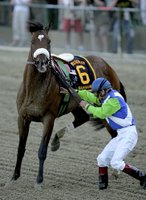
Jockey tries to steady Barbaro after his injury in the Preakness.
We are all waiting to see the outcome of Barbaro's injury and hoping for the best.
It's always about a 50-50 chance when a race horse breaks a leg. I remember an article I read in Time many years ago about a horse that had broken its leg and died shortly thereafter, despite good care. The horse wouldn't stay still. It kept thrashing around, re-breaking places in the leg.
What made him such a great runner was what killed him, the editorial said. The will to win. The spirit.
Without a neocortex, the horse can't understand "intellectually" that it must keep still. Of course some people, too, even with the aid of a neocortex can't understand what's best for them, or aren't willing to do it. They get swept away by the emotion. As we say, "You can't reason OUT of someone what hasn't been reasoned INTO them."
I don't know too much about horses or racing, but one article I read about Barbaro said the he was smart. That he stopped, while some horses will continue running with the leg broken, which shatters the bones, drives splinters up into tissue, and exponentially complicates the injury.
In watching the reruns, it seemed to me that Edgar Prado, Barbaro's jockey (who modestly refers to himself as 'only a passenger') had reined the horse in immediately.
Prado is known for his concentration, which is often mistaken for anger. In fact he looked angry during the post-race interview. It would be understandable if he were. Anyway, since my facial expression during intense concentration is often misinterpreted in the same way, I commisserate. And I have learned, like Prado, to explain it to others.
Prado, from Peru, and one of 12 children, rarely shows his feelings, writers say; that his face remains expressionless whether he wins or loses.
"I'm not a very emotional person," Prado says. "I like to keep it nice and quiet. That's the way I've always been."
I would think this sort of focus (an EQ competency) would be crucial for Prado's job, which is more dangerous than most people realize. The pressures are immense around something like the Triple Crown. All the things Prado has to keep in mind, including the wellbeing of the horse, and the millions riding on the outcome. What goes on out there once the race begins is what has given us the phrase "jockeying for position" -- and this with hundreds of pounds of moving horse under you and all around you to control (manage) as well. One strategy for winning is to push other horses out of the optimal position, while others want to do the same to you.
Prado humbly credits others for wins -- the owners, the trainers, and especially the horse itseld.
The interviews with Prado after the race were about what you would expect. The same focus and concentration.
It's always so sickening when something like this happens. Being in the wrong place ... just a dip in the track, a rock ... it doesn't take much.
We await the outcome.

No comments:
Post a Comment